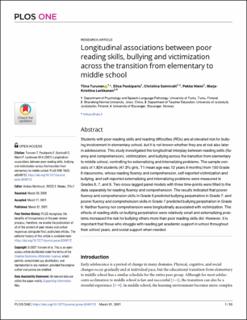| dc.contributor.author | Turunen, Tiina | |
| dc.contributor.author | Poskiparta, Elisa | |
| dc.contributor.author | Salmivalli, Christina | |
| dc.contributor.author | Niemi, Pekka | |
| dc.contributor.author | Lerkkanen, Marja-Kristiina | |
| dc.date.accessioned | 2021-11-08T12:58:43Z | |
| dc.date.available | 2021-11-08T12:58:43Z | |
| dc.date.created | 2021-08-16T12:18:50Z | |
| dc.date.issued | 2021-03 | |
| dc.identifier.citation | Turunen, T., Poskiparta, E., Salmivalli, C. et al. (2021) Longitudinal associations between poor reading skills, bullying and victimization across the transition from elementary to middle school. PLOS ONE, 16 (3) : e0249112 | en_US |
| dc.identifier.issn | 1932-6203 | |
| dc.identifier.uri | https://hdl.handle.net/11250/2828392 | |
| dc.description.abstract | Students with poor reading skills and reading difficulties (RDs) are at elevated risk for bullying involvement in elementary school, but it is not known whether they are at risk also later in adolescence. This study investigated the longitudinal interplay between reading skills (fluency and comprehension), victimization, and bullying across the transition from elementary to middle school, controlling for externalizing and internalizing problems. The sample consists of 1,824 students (47.3% girls, T1 mean age was 12 years 9 months) from 150 Grade 6 classrooms, whose reading fluency and comprehension, self-reported victimization and bullying, and self-reported externalizing and internalizing problems were measured in Grades 6, 7, and 9. Two cross-lagged panel models with three time-points were fitted to the data separately for reading fluency and comprehension. The results indicated that poorer fluency and comprehension skills in Grade 6 predicted bullying perpetration in Grade 7, and poorer fluency and comprehension skills in Grade 7 predicted bullying perpetration in Grade 9. Neither fluency nor comprehension were longitudinally associated with victimization. The effects of reading skills on bullying perpetration were relatively small and externalizing problems increased the risk for bullying others more than poor reading skills did. However, it is important that those who struggle with reading get academic support in school throughout their school years, and social support when needed. | en_US |
| dc.language.iso | eng | en_US |
| dc.publisher | Public Library of Science (PLoS) | en_US |
| dc.rights | Navngivelse 4.0 Internasjonal | * |
| dc.rights.uri | http://creativecommons.org/licenses/by/4.0/deed.no | * |
| dc.subject | utdanningsvitenskap | en_US |
| dc.subject | lesevitenskap | en_US |
| dc.subject | lesevansker | en_US |
| dc.subject | mobbing | en_US |
| dc.title | Longitudinal associations between poor reading skills, bullying and victimization across the transition from elementary to middle school | en_US |
| dc.type | Peer reviewed | en_US |
| dc.type | Journal article | en_US |
| dc.description.version | publishedVersion | en_US |
| dc.rights.holder | © 2021 Turunen et al. | en_US |
| dc.subject.nsi | VDP::Samfunnsvitenskap: 200::Pedagogiske fag: 280 | en_US |
| dc.source.volume | 16 | en_US |
| dc.source.journal | PLOS ONE | en_US |
| dc.source.issue | 3 | en_US |
| dc.identifier.doi | 10.1371/journal.pone.0249112 | |
| dc.identifier.cristin | 1926297 | |
| dc.source.articlenumber | e0249112 | en_US |
| cristin.ispublished | true | |
| cristin.fulltext | original | |
| cristin.qualitycode | 1 | |

